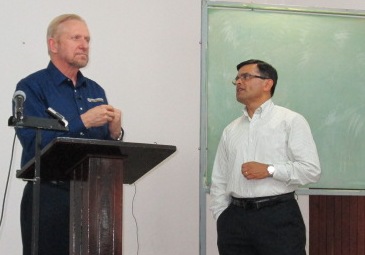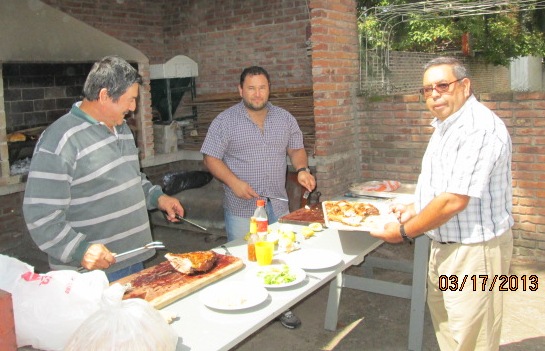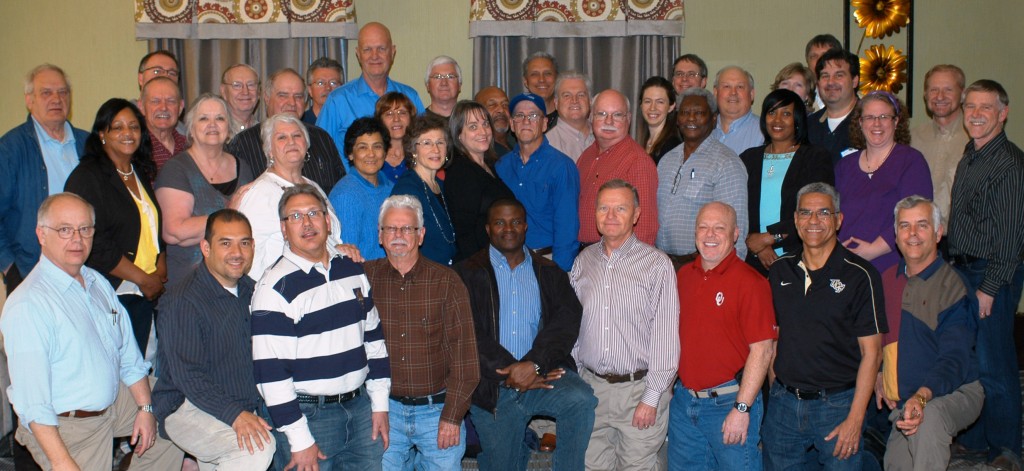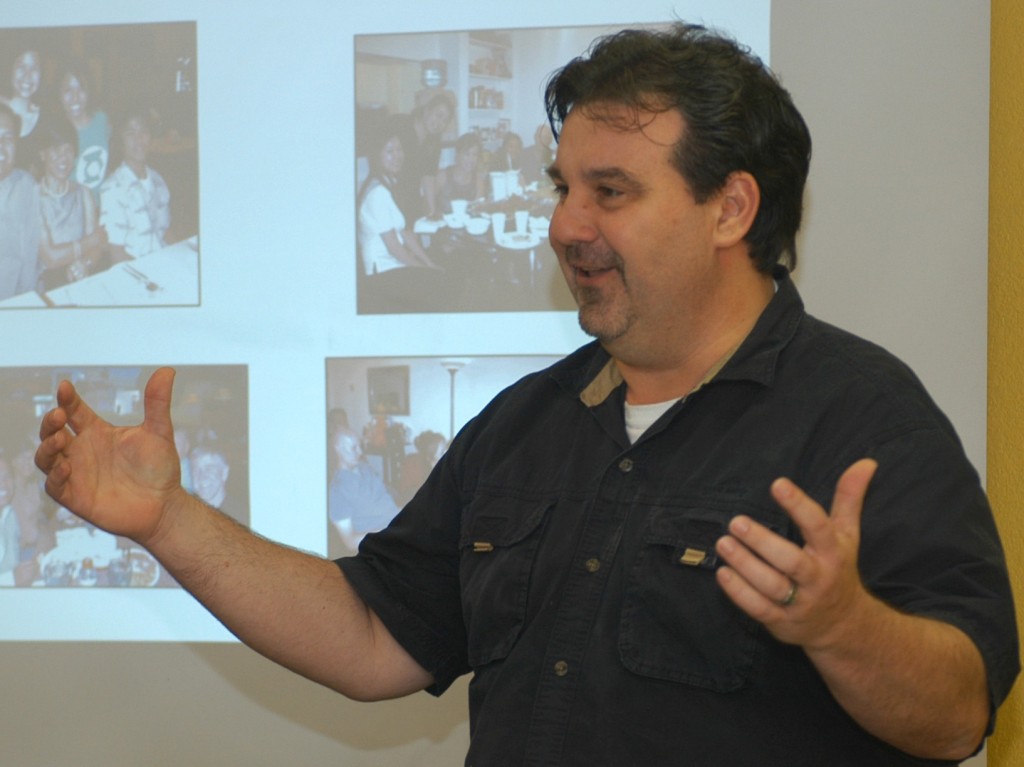This article is part one of a six-part series by Gary Deddo on interpreting Scripture. For the other parts, click on a number: 2, 3, 4, 5, 6.
The Christian church down through the ages has always regarded the Bible as indispensable for its worship, devotion and life. Its very existence is bound up with it. The church would not be what it is without it. Holy Scripture is part of the air it breathes and the food it eats.
I learned of the importance of the Bible as a young child and was encouraged and taught to read it and memorize it. I studied it both on my own and with others—I’m glad I did, now years later. The study of the Bible has always been an essential part of my ministry in serving others whether it was teaching it, preaching from it, studying it with small groups of other Christians, or referring to it when counseling others. When I attended seminary my primary focus was the study and interpretation of Scripture. It was so important to me that I was willing to try to learn Hebrew and Greek to see if I could understand Scripture better!
Along the way, I learned that there were various ways the nature and place of Scripture was understood and various ways to make use of it. Some of these seemed better than others, while some seemed to lead to the misuse of Scripture, or even to making it irrelevant. I read books and took courses to sort out these issues hoping I could find some wisdom in all this not only to help me, but to pass on to others.
Scripture is so essential to the Christian faith that most denominations have an official statement concerning the importance and place of Scripture. GCI is no exception. These summaries can be a good place to start reflection on the nature, purpose and right use of Scripture. GCI’s statement is brief, to the point and fairly comprehensive:
The Holy Scriptures are by God’s grace sanctified to serve as his inspired Word and faithful witness to Jesus Christ and the gospel. They are the fully reliable record of God’s revelation to humanity culminating in his self-revelation in the incarnate Son. As such, Holy Scripture is foundational to the church and infallible in all matters of faith and salvation.
Let’s explore what’s behind this theological summary of our understanding of Scripture. We do so not so we can enter into endless debate or prove ourselves superior to other Christians who might have a different view. And I don’t think we simply want a theory about it. We seek understanding of Scripture because we highly value it and want to honor and make proper use of it. We want to handle it well so we can get the most out of it. And these very things Holy Scripture itself encourages us to do. We also can recall that others in church history have benefited greatly through a deep understanding of Scripture and how to interpret it. But in the end, I think we want to grasp and use it well because we hope to get to know even better the God of the Bible in whom we put our faith.
By God’s Grace
Many of us have sung the childhood song that says: “Jesus loves me, this I know—for the Bible tells me so.” And that’s true enough. However there’s a different way to sing that verse that is also true: “Jesus loves me this I know—so the Bible tells me so!” This second way is reflected in the GCI statement that the Bible is God’s gift to us, a gift of grace and so of his love. Because God loves us in and through Christ, he has graciously provided us his written Word.
God didn’t have to do so, but his love for us, his creatures, has moved him to provide us with his Word in written form. God’s love for us comes first, then follows his provision of the Bible. We wouldn’t really be able to know and love God if God hadn’t first loved us and communicated to us through his written Word. God gives us his word in Scripture because he loves us and wants us to know that he does. We should always remember that the Bible is God’s gracious gift of love to us.
God Continues to Empower His Word
But that’s not the end of it. Human words in and of themselves don’t have the capacity to reveal to us the truth and reality of God. Human words are just that, human. They derive primarily from our human experiences. But God is not a creature and can’t be simply grasped in creaturely terms, concepts and ideas. Words, when referring to God, don’t mean exactly the same thing as when they refer to creation. So we can say we “love” and we can say God “loves.” But God’s love far exceeds our love. We use the same word, but we don’t mean the same thing when we use it of God compared to when we use it of ourselves. Yet our love can be a dim mirror image of God’s love. So God himself has to sanctify, make holy and adequate, our mere human words so we can use them to accurately and faithfully refer to the God of the Bible and not lead us into misunderstandings of God and his ways.
The God of the Bible is active and continually gracious to us by superintending our reading and interpretation of Scripture, helping us to see how they uniquely make God and his ways known to us. He has not become mute since the Bible came into existence. God continues to speak in and through his written Word, enabling it to refer to him and not just to creaturely ideas or realities. The God of the Bible continues to speak his word to us through this gift of written revelation.
If God ceased to be personally involved and stopped empowering the written word to accomplish the miraculous feat of enabling us to know him, then God would not be truly known. We would simply have human and creaturely ideas about God to consider and nothing more. The result would likely be not much better than the ancient Greek and Roman mythological gods.
Inspired by the Spirit
 If we ask, “How has God spoken and made himself known to us?” it turns out that this work involves the whole of God, that is, the Father, Son and Holy Spirit. The word “inspired” means “God breathed.” The Holy Spirit is identified as the wind or breath of God. By the Spirit of God, certain people down through the ages were called, appointed and specially enabled to speak authoritatively for God. They were “inbreathed” by the Spirit. How exactly the Spirit works we do not and cannot know. But we have been told that the Spirit can and has empowered first the prophets of the Old Testament and then the apostles of the New Testament.
If we ask, “How has God spoken and made himself known to us?” it turns out that this work involves the whole of God, that is, the Father, Son and Holy Spirit. The word “inspired” means “God breathed.” The Holy Spirit is identified as the wind or breath of God. By the Spirit of God, certain people down through the ages were called, appointed and specially enabled to speak authoritatively for God. They were “inbreathed” by the Spirit. How exactly the Spirit works we do not and cannot know. But we have been told that the Spirit can and has empowered first the prophets of the Old Testament and then the apostles of the New Testament.
The Spirit seems to take into account everything about a particular prophetic or apostolic author and graciously makes use of them. The Spirit incorporates their language, culture and social-political background as well as their own relationship with God into his communicative purposes. The Spirit uses the human elements of the selected prophets and apostles. But the Spirit uses these elements in a way that enables them to refer far beyond creaturely realities. The Spirit takes charge of them in a way that gives those words a capacity to communicate that they could never have on their own.
So by the Spirit, Scripture as a whole serves as a written form of communication that God can continually use to make himself and his ways known to his people down through the ages. If the Spirit was not at work with these individuals, we would not have any authoritative and trustworthy access to God’s word. So we can thank God for choosing certain individuals down through the ages and, by his Spirit, inspiring them to speak faithfully for him.
Providential Preservation
We have these written words because they have somehow been preserved for us down through the ages. This too must be regarded as the gracious work and gift of God. Because of his great love for us the God of the Bible not only kicked things off by selecting and inspiring certain individuals, but also by overseeing them being handed on and finally collected together. We call this form of God’s grace his providence.
Apparently an aspect of God’s providential oversight also included some inspired editing of preexisting material. God providentially maintained contact with his written word and with the process by which it was canonized (brought together in an authoritative collection). Of course if the God of the Bible wanted us to have a written witness to his Word, then we shouldn’t be surprised that God would also have to anticipate and secure its preservation down through the ages (you do, after all, have to be pretty smart to be God!).
The Self-Revelation
The gracious gift of revelation as it traces through history does reach a crucial high-point. All the prophetic words prepare for and look forward to the self-revelation of God in Jesus Christ, the Incarnate Son of God. And all the apostolic writings look back to the time and place where God himself, as himself, reveals and interprets himself in and through Jesus Christ.
In Jesus, we don’t have simply another inspired word about God, but the Living Word of God himself, in person—in time and space and in flesh and blood. So Jesus tells us that he is, himself, the Way, the Truth and the Life. He does not show us a way or tell us about the truth or give us things that lead to life. He himself is these things. Thus God’s gracious revelatory work reaches a qualitatively different level with the birth of the Word of God in human form. And, as it turns out, the written word of God’s Spirit-inspired prophets and apostles point to the fulfillment of their own word with the coming of the Living Word.
John the Baptist, as the last of the prophets and representative of them all, serves as an authoritative witness when he points to Jesus as being the Light, the Lamb of God who takes away the sins of the world, the Messiah and the Son of God (John 1:8; 29-34). John proclaimed that Jesus came before him and is the one who baptizes with the Spirit. Therefore John said he must decrease and Jesus increase, for Jesus is the center of the center of God’s revelatory work and thus stands at the very center of Holy Scripture.
Faithful and Infallible
The written word, derives its authority and faithfulness from the Father, through the Son and in the Spirit. Because God is the living and speaking God, we have a written word that puts us in touch with the Living Word of God, all by the Spirit. The Bible’s authority is established and maintained by a living and real connection of God to the Bible. Scripture can serve as it does because it remains connected to the infallible God. The Bible’s authority and faithfulness is not in itself, apart from God, but in its actual, continuing connection with the Father, Son/Word and Spirit. So when we read or listen to the Bible, we can expect to hear the living, triune God speak to us once again.













